About the Department
The department comprises of dedicated, experienced and qualified faculty members with teaching and research proficiency. In addition to teaching, faculty members are actively engaged in research by applying and carrying out funded projects. Faculty members also have research publications of their research findings in reputed indexed journals. The thrust areas of research include Marine Bio products, Applied Immunology, Plant- Microbe Interactions, Molecular drug resistance mechanisms, Molecular interactions in biofilms, Medical and Applied Mycology, Bio-nanomaterials etc.
The department has organized many conferences/seminars/workshops/guest lectures for the benefit of the student community in providing opportunity to interact with scientists and delegates from other universities and industries. Students are also encouraged to participate/present their research findings in International and National Conferences. The department is also actively linking up with industries of high repute in terms of short-term training and student projects. The department has signed an MoU with Asian Enviro Labs for training of students. The alumni of the department are well placed in government and non-government sectors. The department along with a well functioning placement cell enables students to get good placements in healthcare, food, dairy, pharmaceutical industries. Overall, the department provides conducive environment to foster research led academic programs enabling students to be professionally competent.
Vision & Mission
Vision of the Department
To produce graduates with relevant education descriptors and hands-on skills in microbiology and related areas of life sciences plus holistic development of individuals that makes them responsible citizens of society.
Mission of the Department
• Imparting relevant knowledge and creating an atmosphere to develop innovative and critical thinking.
• Skill enhancement through hands-on training and value-added courses plus add on courses.
• Sustained focus on original high quality research encouraging scientific thinking and approach.
• Creating an environment for holistic development of individuals with emphasis on spirit of integrity, equity, professional ethics and social harmony through the exposure and participation in co-curricular, extracurricular and extension activities.
Programmes Offered
- B.Sc MICROBIOLOGY
- M.Sc IMMUNOLOGY & MICROBIOLOGY,
- M.Phil, Ph.D
Faculty-Student Ratio: 1: 20
Program Educational Objectives (PEOs)
PROGRAM EDUCATIONAL OBJECTIVES (PEO)
PEO1: To provide the graduates with knowledge in microbiology and an overview of the processes that employ or deal with microbes that enables them to handle the safe and efficient use of microbiological applications with development of competence on par with global standards and helps the graduates for life-long learning.
PEO2 To prepare graduates by imparting skills to use technological developments related to current and advanced areas involving molecular diagnostics, immunotechnolgy, mass cultivation of microbes, downstream processing and nanotechnology with scope for upskilling in all potential future technologies so as to contribute effectively for Research & Development leading to patenting and publishing.
PEO3: To train graduates to choose a decent career option either as Entrepreneur or having a high degree of employability; or pursue higher education – by empowering students with basic interpersonal skills, ability to handle critical situations allowing them to be good team members as well as training to excel in competitive examinations.
PEO4: To impart a strong sense of social responsibility with awareness of professional and societal ethical values and scope to develop leadership capabilities.
PEO5 : To establish an environment that accentuates the requirement to fulfil life-long learning for the overall development of self and society at large.
Program Outcomes (PO) & Program Specific Outcome (PSO)
PROGRAM OUTCOMES (PO)
PO1- Microbiology knowledge: Graduates will acquire microbiology specific knowledge including molecular biology, immunology and rDNA technology coupled with hands-on skills and leadership skills for a successful career.
PO2- Problem analysis: Graduates will be able to analyse, solve and troubleshoot problems in implementation of microbiological protocols.
PO3- Design/development of solutions: Graduates will develop creative thinking and cooperate with each other to solve problems in the field of microbiology.
PO4- Conduct investigations of complex problems: Graduates will acquire practical skills – which help in planning and designing protocols to validate hypothesis and execute experimental techniques independently as well as assimilate, analyse and interpret subsequent data.
PO5- Modern tool usage and communication: Graduates will effectively be able to manage resources and time using ICT and computer enabled devices and accomplish ability to understand and communicate all ideas effectively.
PO6- Environment sustainability and Ethics: Graduates will get adequate knowledge to use information and implement solutions for environmental protection and remediation. Graduates will be aware of their role and responsibility in handling and use of microbes including genetically modified microorganisms.
PO7- Lifelong learning: Graduates will carry on to learn and adapt in a world of constantly evolving technology.
PROGRAM SPECIFIC OUTCOME (PSO)
PSO1: Microbiology skills: The ability to understand the basic concepts related to the relevant fields of microbiology which will enable them to analyse and develop solutions to microbiology related problems.
PSO2: Microbiology related employability skills: The ability to use the acquired hands-on skills in microbiology, molecular biology, immunology, medical microbiology and screening for useful biomolecules within employment areas.
PSO3: Successful Career and Entrepreneurship: The ability to gainfully become an entrepreneur by using microorganisms to produce biofertilizers, mushrooms and pharmaceutically important biomolecules as well as using practical hands-on training to become employed in diagnostic, industrial, pharmaceutical, food and research and development laboratories.
Curriculum & Syllabus
CURRICULUM & SYLLABUS
MINIMUM CREDITS TO BE EARNED: 140
| Hours/week | Maximum Marks | |||||||
|---|---|---|---|---|---|---|---|---|
| Code No. | Course | Lecture | Tutorial | Practical | Credits | CA | SEE | Total |
| SEMESTER 3 | ||||||||
| LANG | Tamil III/ Hindi III/ French III | 3 | 0 | 0 | 3 | 40 | 60 | 100 |
| ENG | English – III | 3 | 0 | 0 | 3 | 40 | 60 | 100 |
| CORE 7 | Introduction to Environmental Microbiology | 4 | 0 | 0 | 4 | 40 | 60 | 100 |
| CORE 8 | Basic Food Microbiology | 3 | 0 | 2 | 4 | 40 | 60 | 100 |
| CORE 9 | Introduction to Virology | 4 | 0 | 0 | 4 | 40 | 60 | 100 |
| AECC | Environmental Studies | 2 | 0 | 0 | 2 | 40 | 60 | 100 |
| CORE | Practical in Environmental microbiology | 0 | 0 | 4 | 2 | 40 | 60 | 100 |
| SEC | Soft Skills - II / Sector Skill Council Course | 2 | 0 | 0 | 2 | 40 | 60 | 100 |
| SEC | Swayam / NPTEL / Value Added Course | - | - | - | - | - | - | - |
| Total | 21 | 0 | 6 | 24 |
Program Educational Objectives
PROGRAM EDUCATIONAL OBJECTIVES (PEOs)
PEO 1:To provide the candidates with in-depth knowledge in immunology and microbiology and afirm grasp of the processes that employ or deal with microbes plus adept use of immunological techniques in relevant technologies that empowers them to deal with the safeand efficient use and monitoring of microbiological and immunological applications with development of competence on par with global standards and helps in the life-long learningof candidates.
PEO 2:To enable candidates by imparting updated analytical and hands-on skills to use andimplement technological developments related to advanced and potential areas involving molecular diagnostics, automated systems of diagnosis, immunoblotting technology,upstream or downstream processing and nanotechnology with scope for upskilling upto future technologies so as to contribute effectively for Research & Development leading topatenting and publishing.
PEO 3:To train candidates to choose a decent career option either as Entrepreneur or having a high degree of employability; or pursue research – by providing training in interpersonal skills,sense of social responsibility, ethical and administrative acumen, ability to handle critical situations allowing them to be good team members and leaders as well as training to excel incompetitive examinations.
PEO 4:To impart a strong sense of social responsibility with awareness of professional and societal ethical values and scope to develop leadership capabilities with the continuous need for lifelong learning.
Eligibility Criteria
| Program | Program Duration (Year) | Eligibility | Criteria for Merit |
|---|---|---|---|
| B.Sc Micro-Biology | 3 Years (6 Semesters) | A pass in higher secondary with Physics, Chemistry, Biology/ Botany/ Zoology/ Vocational – Agriculture or any Life Sciences | Merit based on the percentage of marks secured in the qualifying examination |
Programme Outcomes & Programme Specific Outcomes
PROGRAM OUTCOME (PO)
PO-1: Life Sciences knowledge: Successful candidates will apply current/recent specific knowledge in the respective discipline with proficiency in practical skills and leadership skills for a successful career.
PO-2: Problem analysis: Successful candidates will be able to apply the knowledge in microbiology to design standards, resolve and troubleshoot problems in implementation or standardization of protocols.
PO-3: Design/development of solutions: Successful candidates will develop creative and cognitive thinking and cooperate with each other to solve problems in the field of Life sciences.
PO-4: Conduct investigations of complex problems: Successful candidates will acquire capabilities to plan and design protocols and utilize practical skills to validate hypothesis by executing experimental techniques independently coupled with the ability to assimilate, apply, analyze, interpret and accurately evaluate subsequent data.
PO-5: Modern tool usage: Successful candidates will effectively be able to choose and manage resources including time using ICT and other computer enabled devices.
PO-6: Ethics: Successful candidates will be aware of their role and responsibility in proper handling, use and safe disposal of microbes including genetically modified microorganisms.
PO-7: Communication: Successful candidates will have the ability to understand and communicate all ideas and concepts effectively.
PO-8: Environment sustainability: Successful candidates will get adequate knowledge to use information and implement solutions for environmental protection, safeguards and remediation.
PO-9: Lifelong learning: Successful candidates will carry on to learn, adapt and disseminate knowledge in a world of constantly evolving technology.
PROGRAMME SPECIFIC OUTCOMES (PSOs)
The overall outcome of graduates specific to M.Sc. in Immunology & Microbiology programme at VISTAS can be summarized as:
PSO 1:The ability to understand, implement and troubleshoot the concepts related to the fields ofmicrobiology and immunology which will enable them to analyse and develop solutions tomicrobiology, immunology and rDNA related problems using knowledge and hands-on skillsin microbiology, molecular identification, immunodiagnostics, screening for useful biomolecules and nanotechnology in the interpretation of data in relevant protocols.
PSO 2:The ability to gainfully become an entrepreneur by using microorganisms to mass producebiofertilizers, mushrooms or any other edible forms of SCP, fermented productsand pharmaceutically important biomolecules as well as using knowledge, communication andpractical hands-on training to become employed in diagnostic, industrial, pharmaceutical, food and research and development laboratories.
PSO 3:The ability to understand the principles and concepts underlying immunology and microbiology, including the interactions between microorganisms and the immune system and to Possess proficient laboratory skills in techniques relevant to immunology and microbiology, including culturing microorganisms, performing immunological assays, and molecular biology techniques such as PCR and sequencing etc.,
PSO 4:The ability to critically analyze the research in Immunology and Microbiology and to evaluate experimental design, methodology and interpretation of results and to understand the regulation of immune responses which includes the roles of different immune cells, cytokines and signaling pathways in health and disease.
PSO 5:For the effective scientific communication and to relate microbes and their role in ecosystem and public health research with wide opportunities and career prospects.
Career Prospects
CAREER PROSPECTS
- Clinical Laboratory Scientists
- Food Scientists and Technologists
- Immunologists
- Mycologists
- Parasitologists
- Personal Care Product and Cosmetic Scientists and Technologists
- Pharmaceutical Scientists and Technologists
- Science Writers
- Technical Support Specialists
- Virologists
- Water Quality Laboratory Technicians
Curriculum & Syllabus
CURRICULUM & SYLLABUS
MINIMUM CREDITS TO BE EARNED: 90
| Hours/week | Maximum Marks | |||||||
|---|---|---|---|---|---|---|---|---|
| Code No. | Course | Lecture | Tutorial | Practical | Credits | CA | SEE | Total |
| SEMESTER 1 | ||||||||
| CORE 1 | Cell Culture and Fermentation Technology | 4 | 0 | 0 | 4 | 40 | 60 | 100 |
| CORE 2 | Immunology | 4 | 0 | 0 | 4 | 40 | 60 | 100 |
| CORE 3 | General Microbiology | 3 | 0 | 2 | 4 | 40 | 60 | 100 |
| CORE | Practical Immunology and Systemic Bacteriology | 0 | 0 | 4 | 2 | 40 | 60 | 100 |
| DSE | Medical Bacteriology and Virology | 4 | 0 | 0 | 4 | 40 | 60 | 100 |
| DSE | Industrial Microbiology | 4 | 0 | 0 | 4 | 40 | 60 | 100 |
| SEC | Soft Skill 1 | 2 | 0 | 0 | 2 | 40 | 60 | 100 |
| Total | 21 | 0 | 6 | 24 | 280 | 420 | 700 |
Alumni Testimonials

“My experience at Vels university was quite different and before my showtime i was afraid of my future. Once after entering microbiology department, i made cohesive bonding and cognition among faculty, who enlightened my path towards extensive and intensive knowledge on microbiology. The astonishing environment of Vels university propelled me into my masters program in a top college. I thank them for feeding me with knowledgeable fuel to drive my future in successful roads.”
Mr. MOHINUDEEN (B. Sc Microbiology) 2012-2015 Batch
Business Manager, Pfizer Ltd, Chennai.

I have finished my graduation from the department of Microbiology, Vels University and it was a good opportunity for me to build up good knowledge in this field. I found this subject very interesting from the first day and the professors from this department helps me a lot to gather knowledge. It was good to be in the lab and learn the skill of different practical works. Finally it was a good experience to be in the department.
Mr. SOMAK BANERJEE (B. Sc Microbiology) 2012-2015 Batch
Academic Specialist, Think and Learn Pvt Ltd., Chennai
Eligibility Criteria
| Program | Program Duration (Year) | Eligibility | Criteria for Merit |
|---|---|---|---|
| M.Sc Immunology & Microbiology | 2 Years (4 Semesters) | Degree in B.Sc., (Microbiology/ Biotechnology/ Biochemistry/ Bioinformatics/ Botany/ Zoology or any Biological Sciences) | Merit based on the percentage of marks secured in the qualifying examination |
Fee Structure
| Tuition Fee 2024 - 2025 (Per Sem) | Other Fee (Per Sem) | Total Fee 2024 - 2025 (Per Sem) |
|---|---|---|
| 17,000 | 13,000 | 30,000 |
Career Prospects
CAREER PROSPECTS
- Clinical Laboratory Scientists
- Clinical or research laboratory manager
- Biotechnologists
- Biosafety officer
- Food Scientists and Technologists
- Immunologists
- Teachers and Professors
- Mycologists
- Parasitologists
- Personal Care Product and Cosmetic Scientists and Technologists
- Pharmaceutical Scientists and Technologists
- Research associate
- Science Writers
- Technical Support Specialists
- Virologists
- Water Quality Laboratory Technicians
Faculty of the Department
| Sl. No. | Name of the Faculty | Designation | Educational Qualification | Area of Specialization | Experience in Years | Vidwan ID | Photos |
|---|---|---|---|---|---|---|---|
| 1 | Dr.AK.Kathireshan | Professor & Director | M.Sc., M.Phil., SLET, Ph.D | Molecular Drug Resistance, Plant Microbiome and Bioprospecting of Marine Algae | 29 years 1 month | 234065 | 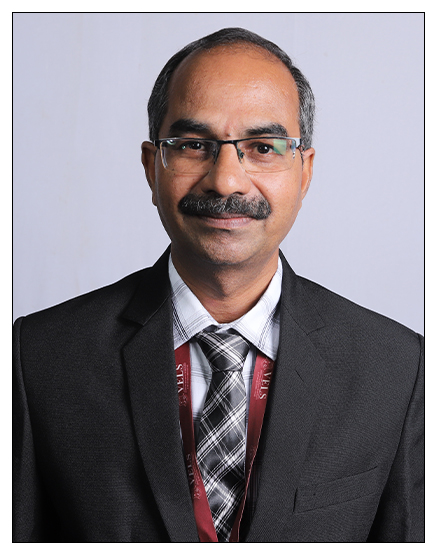 |
| 2 | Dr.Gayathri.G | Associate Professor & Head | M.Sc., M.Phil, SET, Ph.D | Microbial Biofilms, Nanomaterials, Immunotherapeutics | 25 years 2 months | 173799 | 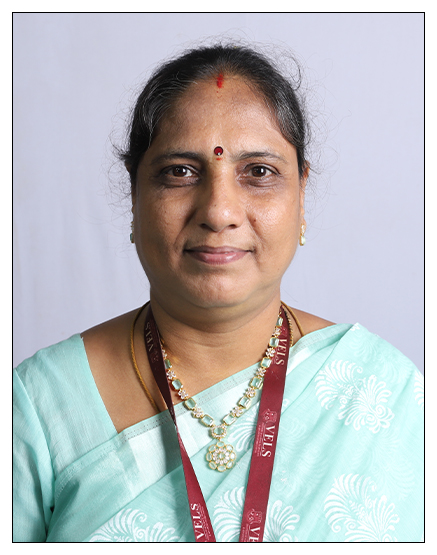 |
| 3 | Dr.Suresh Dhanaraj | Associate Professor | M.Sc.,M.Phil, Ph.D,NET. | Microbial Nanotechnology, Fermentation Technology | 24 years 2 months | 290392 | 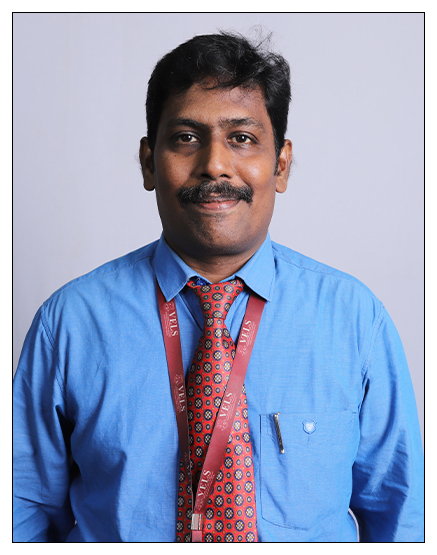 |
| 3 | Dr.Prabha.S.B | Assistant Professor | M.Sc., Ph.D | Applied Microbiology | 8 years2 months | 234101 | 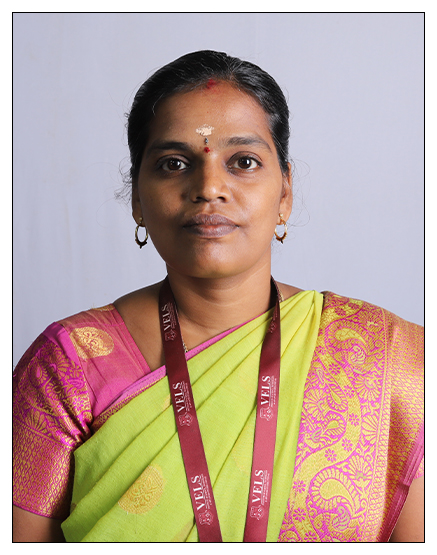 |
| 5 | Dr.Raj Yoganandh.S.V | Assistant Professor | M.Sc., Ph.D | Mycology, Antimicrobial resistance | 5years,0months | 234082 | 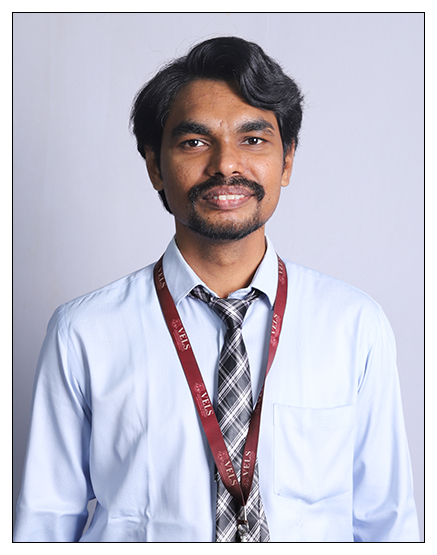 |
| 6 | Dr.Murugan.K | Assistant Professor | M.Sc, Ph.D | Bioremediation, Biodegradation, Waste water treatment using VBNC Bacteria | 1years,1months | 469422 | 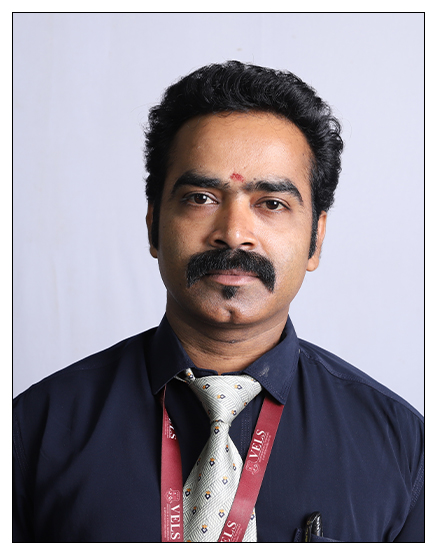 |
| 7 | Dr.Sudharsan.K | Assistant Professor | M.Sc, Ph.D | Industrial microbiology, Biopolymer production | 7 years 10 months | 469400 | 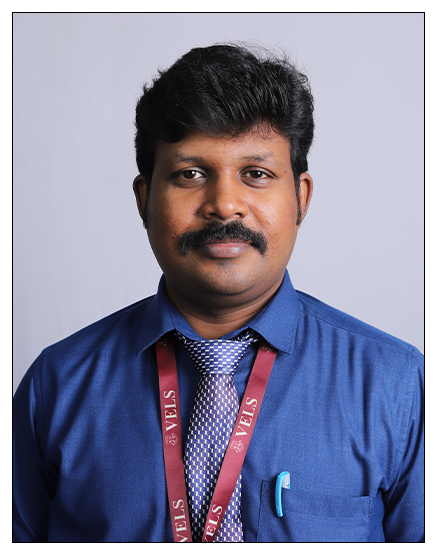 |
Alumni Testimonials

If you asking me about my experience during study in Vels University, it was awesome and full of enthusiasm. Most important fact is that our teachers were so co-operative, simple and well informed . They always motivate us to innovate and to be an expert in our field. Besides this friends in our department and in other department too were so friendly. As I come across the whole two year course, I always felt a sense of unity in diversity of all Indian culture in Vels. The centrally location of Vels near to Chennai city help us to travel to shopping mall and city side for amusement during weekends . In my view to become a good person and make a good personality, Vels university is a good choice. Thank you to give me this opportunity to share my experience.
Mr. Anup Ranjan Jena (M.Sc. Microbiology) 2010-2011
Marketing Manager,Imgenex

When I decided to do my M.Sc , I came across in contact of many Universities in Bangalore and Chennai, but at last I stopped in VELS University (VU) in Chennai. I have seen many universities, which are doing business of education instead of giving quality of studies to students. But VU is best, which is always thinking of students’ perspective. I had a great time at VU. It was very helpful in achieving my career goal and converts my endeavors into real time world. The faculties are very experienced and committed to help the students to excel. I am very thankful to the faculty that gave me the knowledge and confidence and has brought a new dimension into my life to achieve a successful career .I would strongly recommend anyone to VU for its quality in studies/course frame. Very Best,
Mr. BIRAJA S. PATTNAIK (M.Sc. Microbiology) 2009-2011
Food Technologist
Fee Structure
| Tuition Fee 2024 - 2025 (Per Sem) | Other Fee (Per Sem) | Total Fee 2024 - 2025 (Per Sem) |
|---|---|---|
| 25,000 | 20,000 | 45,000 |
 CHAT WITH A STUDENT
CHAT WITH A STUDENT